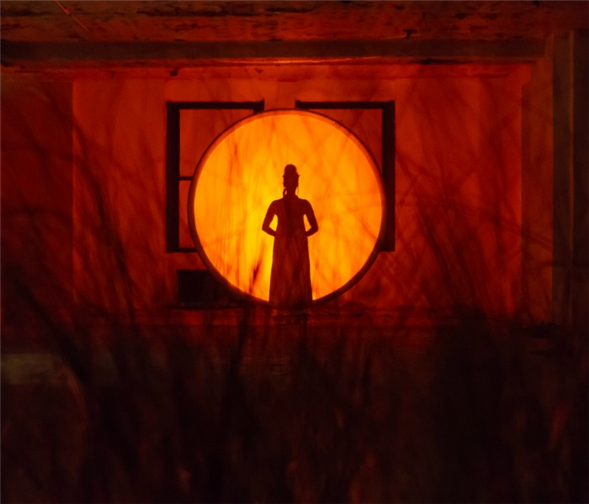Translate Page

En Garde Arts' new show about the Rwandan genocide asks who owns history
---
On the empty ninth floor of an office building in downtown Manhattan, En Garde Arts has conjured two wildly different worlds: the under-construction headquarters for a Manhattan nonprofit, and the rural Rwandan countryside. Those are the settings for Red Hills, the troupe's new site-specific work about the Rwandan genocide.
In the first locale, a white American man named David Zosia (played by Christopher McLinden) welcomes the audience to the launch party for his new organization, which aims to foster forgiveness among survivors of genocide. As the best-selling author of Dogs of Rwanda, a memoir about his experiences as a Christian missionary in the country during its holocaust, it's a cause that's dear to him.
Suddenly, a Rwandan tour guide named God's Blessing (Patrick J. Ssenjovu) interrupts and invites us to the fields of his country, located just around the bend. Nestled in the tall grass is a church that's become a shrine to the people killed there, their old clothes a chilling reminder of the slaughter.
God's Blessing and Zosia met as teenagers in 1994 when at least 500,000 Rwandans were massacred by their fellow countrymen over a 100-day period. The young men had not kept in touch, but when God's Blessing stumbled upon Zosia’s book, he felt compelled to confront the writer about some of its content. God's Blessing asks us to be witnesses in what he refers to as "our Gacaca," the name of the special Rwandan courts that were set up in the genocide's aftermath.
{Image2}
"This is not a history play about the Rwandan genocide," insists Red Hills director Katie Pearl. "It's grappling with the question, who gets to tell the story? Who owns history?"
That central issue was actually part of the creation of Red Hills. Several years ago, playwright Sean Christopher Lewis penned a play called Dogs of Rwanda, which recently ran at Urban Stages. In it, a character named David Zosia tells more or less the same story as in Red Hills. When Lewis sent that original script to En Garde Arts, artistic director Anne Hamburger saw promise in it, even though, as she says, "it was a white guy sitting at a desk." Yet, "at the core was this relationship between this Rwandan and the American. I thought there was real beauty in talking about two well-meaning people who both just couldn't connect." She told Lewis: "If we change the title, turn it into a two-character play, and make it site-specific, I’m interested."
En Garde Arts enlisted Ugandan playwright Asiimwe Deborah Kawe to add God’s Blessing's perspective. She edited out much of the history -- that's "something that anybody can find online" she says -- and plumbed her memory. As a child, she and her father, who is of Rwandan descent, continually listened to live radio reports about the turmoil in that country.
{Image1}
Red Hills' environmental staging is a hallmark of En Garde Arts shows. Hamburger founded the company in 1985 and pioneered the immersive theatre genre, attracting avant-garde collaborators, some of whom went on to commercial success, including Tony-nominated SpongeBob SquarePants director Tina Landau, who helmed two alfresco stagings of Euripides tragedies, and a pre-Rent Jonathan Larson musical. One of the company's most adventurous productions was 1990's Father Was a Peculiar Man, an adaptation of Dostoevsky's The Brothers Karamazov featuring 60 performers in 16 different locations in the then-seedy Meatpacking District.
Such a project wouldn't be possible in that chichi neighborhood today. Hamburger realized much had changed when she resurrected En Garde Arts in 2014 after a 15-year hiatus during which she worked on the West Coast. "It's harder to do site-specific now because of post-9/11 security concerns," she says. "There also aren't lots of empty historic places anymore. Even the weather is different -- it seems like it rains more."
Consequently, many of En Garde Arts' recent productions have been in conventional theatres, though the company persists in seeking out novel locations when possible. While the cast of Red Hills is small, the show's ambition is vast, as 20,000-square-feet of vacant office space encompasses an entire country and several large ideas. "I love the contradictions between an empty floor of an office building in the financial capital of the world and a Gacaca court in a grassy field in Rwanda," says Hamburger, noting that it's an apt metaphor for the connection between corporate influence and the U.S. "colonization" of many nations. "I love the fact that we're near Wall Street. The wall of Wall Street was created to keep people out," she says. Red Hills was created to bring people together.
---
TDF MEMBERS: At press time, discount tickets were available for Red Hills. Go here to browse our current offers.
Jonathan Mandell is a drama critic and journalist based in New York. Visit his blog at NewYorkTheater.me or follow him on Twitter at @NewYorkTheater. Follow TDF at @TDFNYC.
Top image: Sifiso Mabena in Red Hills. Photos by Hunter Canning.